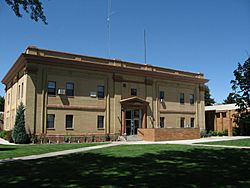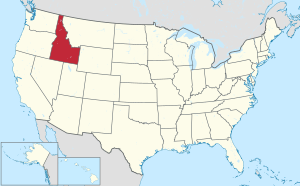Minidoka County, Idaho facts for kids
Quick facts for kids
Minidoka County
|
||
|---|---|---|

Minidoka County Courthouse
|
||
|
||

Location within the U.S. state of Idaho
|
||
 Idaho's location within the U.S. |
||
| Country | ||
| State | ||
| Founded | January 28, 1913 | |
| Named for | Dakota Sioux word meaning "a fountain or spring of water." | |
| Seat | Rupert | |
| Largest city | Rupert | |
| Area | ||
| • Total | 763 sq mi (1,980 km2) | |
| • Land | 758 sq mi (1,960 km2) | |
| • Water | 5.3 sq mi (14 km2) 0.7% | |
| Population
(2020)
|
||
| • Total | 21,613 | |
| • Density | 28.326/sq mi (10.937/km2) | |
| Time zone | UTC−7 (Mountain) | |
| • Summer (DST) | UTC−6 (MDT) | |
| Congressional district | 2nd | |
Minidoka County is a county located in the U.S. state of Idaho. As of the 2020 census, the population was 21,613. The county seat and largest city is Rupert.
Minidoka County is part of the Burley, ID Micropolitan Statistical Area.
The name Minidoka is of Dakota Sioux origin meaning "a fountain or spring of water." Minidoka was first used in 1883 as a name for the Union Pacific's Oregon Short Line, a railroad spur in the middle of the Snake River Plain. The spur later became the site of a watering station along the line. The village of Minidoka grew up next to the station. The Minidoka name was then given to a reclamation project under then President Theodore Roosevelt which included the construction of the Minidoka Dam, completed in 1904. Minidoka National Historic Site (in adjacent Hunt of Jerome County) was part of the original reclamation project and hence shares the name. Minidoka County was created by the Idaho Legislature on January 28, 1913, by a partition of Lincoln County.
Camp Rupert, west of Paul, was a prisoner of war (POW) camp during World War II.
Contents
Geography
According to the U.S. Census Bureau, the county has a total area of 763 square miles (1,980 km2), of which 758 square miles (1,960 km2) is land and 5.3 square miles (14 km2) (0.7%) is water.
It is part of the Magic Valley region of the Snake River Plain. Irrigated farmland covers the southern part of the county, while lava beds cover the northern portion. The elevation is generally in the range of 4,200 to 4,500 feet (1,300 to 1,400 m). The Snake River forms the county's southern boundary.
Adjacent Counties
- Cassia County - south
- Jerome County - west
- Lincoln County - west
- Blaine County - north, east
National protected area
Highways
Demographics
| Historical population | |||
|---|---|---|---|
| Census | Pop. | %± | |
| 1920 | 9,035 | — | |
| 1930 | 8,403 | −7.0% | |
| 1940 | 9,870 | 17.5% | |
| 1950 | 9,785 | −0.9% | |
| 1960 | 14,394 | 47.1% | |
| 1970 | 15,731 | 9.3% | |
| 1980 | 19,718 | 25.3% | |
| 1990 | 19,361 | −1.8% | |
| 2000 | 20,174 | 4.2% | |
| 2010 | 20,069 | −0.5% | |
| 2020 | 21,613 | 7.7% | |
| 2023 (est.) | 22,480 | 12.0% | |
| U.S. Decennial Census 1790–1960, 1900–1990, 1990–2000, 2010–2020 2020 |
|||
2010 census
At the 2010 census, there were 20,069 people, 7,170 households, and 5,315 families in the county. The population density was 26.5 inhabitants per square mile (10.2/km2). There were 7,665 housing units at an average density of 10.1 per square mile (3.9/km2). The racial makeup of the county was 80.2% white, 1.2% American Indian, 0.4% black or African American, 0.4% Asian, 15.3% from other races, and 2.4% from two or more races. Those of Hispanic or Latino origin made up 32.4% of the population. In terms of ancestry, 19.9% were German, 16.8% were English, 10.2% were American, and 6.5% were Irish.
Of the 7,170 households, 37.5% had children under the age of 18 living with them, 59.8% were married couples living together, 9.1% had a female householder with no husband present, 25.9% were non-families, and 22.0% of households were made up of individuals. The average household size was 2.79 and the average family size was 3.27. The median age was 35.3 years.
The median household income was $40,350 and the median family income was $47,079. Males had a median income of $32,895 versus $22,271 for females. The per capita income for the county was $17,747. About 9.4% of families and 13.1% of the population were below the poverty line, including 20.0% of those under age 18 and 7.4% of those age 65 or over.
Education
There is one school district in the county: Minidoka County Joint School District 331. The only public high school in the county is Minico High School near Rupert.
The county is in the catchment area, but not the taxation zone, for College of Southern Idaho.
Communities
Cities
Unincorporated communities
- Jackson (Extends into) Cassia County
- Kimama (Extends into) Lincoln County
Ghost Towns
- Alturas, Idaho (Mostly in Blaine County)
See also
 In Spanish: Condado de Minidoka para niños
In Spanish: Condado de Minidoka para niños


